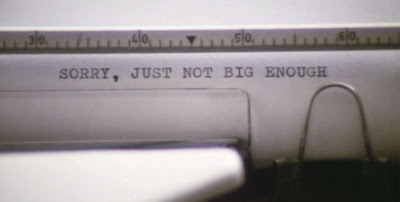I’ve been having a slightly anxious time on a script. Can’t tell you what it is yet but it’s a commission that came up quite quickly and unexpectedly; it’s a project that has to be completed quite fast. I like all this, it suits the way I work, it takes all my newsroom training and applies it to drama – and it means I’ve less time to fret.
Let me tell you right now, most especially if you’re currently wondering whether it’s the script for you that I’m talking about, it’s going fine again. Brilliantly. Flying. In fact, you could stop reading now.
Have they gone? Is it just you and me again?
Sometimes it does fly. I had a problem on it that cost me a day but when I realised the solution, it was so clever I patted myself on the back. And as I contorted around in my chair to do that, I also realised that the clever solution came with a free “oooooooh” moment thrown in. I told Angela. “Ooooooooh, ” she said.
Other times it’s not flying. But I’ve realised why and actually now, here, setting out to talk to you about this, I’ve realised that the reason is deeper than the script, it’s also tied into how my work has changed so much and so quickly. It’s terrific that I am now writing drama and books but it’s very different from just being assigned another feature to do.
Here’s the thing. When I pitch you a script, I start by telling you what it’s about. But as soon as we can, we move on to what it’s really about.
Follow. My first Doctor Who was a short 25-minute piece that was about the Doctor being stuck in prison. It was really about how I think time itself is a prison; this idea I’ve said to you before about how we are trapped here and the very best we can ever hope to do is to bang on the pipes a bit to pass a message along.
You don’t need to know that when you read the script or hear the finished drama. In some ways, it might not even be in there in finished work: certainly it will never be stated or in any way emphasised. But without it, the script is a plot. With it, it’s a story.
So this blog is about how scripts need to have more in them than plot. How they have to have something of you in them or they just don’t work.
But what this blog is really about is my move from journalism to drama.
I say all this to you about plot and theme and it feels a bit arty-farty, to be honest. I am of the get-it-done school, the park your bum at the desk and write until it’s finished. That has served me extremely well in journalism where I’m productive and fast enough that things get written and then I’m fast enough and not so precious that I can change things rapidly too. I don’t believe in the Muse.
Well, I didn’t. And if you tell me a great male artist had to have a woman around as his Muse, I still think he was just trying to impress her and I’m far more interested in what she does than I am in his poncing about.
But Aaron Sorkin said this glorious, liberating thing the other day. He’s working on a biopic of Apple’s Steve Jobs and said: “I’m at the earliest possible stage… What I’ll go through is a long period that, to the casual observer, might very well look like watching ESPN.”
Sheer air pressure propelled me out of my office when I was writing a piece called Wirrn Isle; I spent a day walking around my home city of Birmingham with my head in a futuristic Loch Lomond. It was as necessary as eating and I’d never had that before. With this new script, I’ve tried building in times like this, scheduling them rather than reaching the end of a rope before giving in to it. So yesterday I had a coffee with a guy, today I talked the ears off a water meter inspector, I’ve watched endless episodes of particularly well-written sitcom in the middle of the night.
Not endless. But I’m on my fiftieth episode of The Big Bang Theory since February. It’s not always a great show but so many times it is and the craft in those 19-21 minutes is delicious.
They do so much in that time and by contrast I’ve just spent an hour trying to find you a quote from Dar Williams about the necessity to make time for whatever you call this writing-while-not-writing. I have failed to find this quote. But in keeping with how this noodling about is an essential thing if you’re to create anything new, the search for that quote led me to another one hers that I like.
Asked by the Wall Street Journal how she gets inspiration to write, Dar Williams said: “You have to walk around a lot of museums, a lot of sculpture parks. And time your caffeine, so that you are in an open, wide contemplative space for when the caffeine takes hold.”
It’s 2pm. I forgot to have breakfast, I should probably do something about lunch now too. Drama is a weird world and it’s scaring me a little how I’m having to change to do it.












